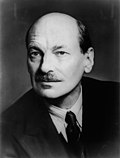26 May 1955 | |||||||||||||||||||||||||||||||||||||||||
All 71 Scottish seats to the House of Commons | |||||||||||||||||||||||||||||||||||||||||
|---|---|---|---|---|---|---|---|---|---|---|---|---|---|---|---|---|---|---|---|---|---|---|---|---|---|---|---|---|---|---|---|---|---|---|---|---|---|---|---|---|---|
| |||||||||||||||||||||||||||||||||||||||||
 Results of the 1955 election in Scotland Conservative/Unionist Labour Liberal National Liberal | |||||||||||||||||||||||||||||||||||||||||
A general election was held in the United Kingdom on Thursday 26 May 1955 and all 71 seats in Scotland were contested. [1] [2] The election brought unparalleled success to the Unionist Party, which gained 50.1% of the vote and 36 of the 71 seats at Westminster. [3] It is often cited as the only time since the Second World War that one party has achieved a majority of the Scottish vote, although six of the Unionist MPs were returned that year under the label of "National Liberal".
Contents
As of 2024 it was the last election in which the Conservative and Unionist Party won the largest number of seats in Scotland. [4]


